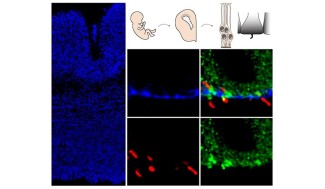Huntington's disease is a genetic neurological disorder that generally appears in adulthood. Teams of researchers and clinicians at the Grenoble Institute of Neuroscience (Inserm/Grenoble Alpes University) and the Brain Institute (Inserm/Sorbonne University/CNRS/AP-HP) have discovered cerebral abnormalities in the brains of human embryos carrying the mutation responsible for Huntington's disease. This work, to be published in Science, raises questions about the mechanisms of silent progression of the disease, and when and how to treat patients in the future.
Although Huntington’s disease is a late-manifesting neurodegenerative disorder, both mouse studies and neuroimaging studies of presymptomatic mutation carriers suggest that Huntington’s disease might affect neurodevelopment. To determine whether this is actually the case, we examined tissue from human fetuses (13 weeks gestation) that carry the Huntington’s disease mutation. These tissues showed clear abnormalities in the developing cortex, including mislocalization of mutant huntingtin and junctional complex proteins, defects in neuroprogenitor cell polarity and differentiation, abnormal ciliogenesis, and changes in mitosis and cell cycle progression. We observed the same phenomena in Huntington’s disease mouse embryos, where we linked these abnormalities to defects in interkinetic nuclear migration of progenitor cells. Huntington’s disease thus has a neurodevelopmental component and is not solely a degenerative disease.
« C’est la première fois que des anomalies du développement cérébral sont mises en évidence dans cette maladie. De plus, celles-ci sont relativement importantes et étendues bien que nous ne soyons pas encore capables de déterminer leurs conséquences directes », clarifient Sandrine Humbert et Alexandra Durr qui ont dirigé ces travaux.
Mais pourquoi les porteurs de la mutation ne manifestent-ils alors aucun symptôme avant un âge avancé ? « À ce stade, nous posons l’hypothèse que le cerveau met très tôt en place des mécanismes de compensation qui permettent un fonctionnement normal. Il se pourrait d’ailleurs qu’il en soit de même chez les personnes porteuses de mutations associées à d’autres types de dégénérescence comme la maladie d’Alzheimer ou la sclérose latérale amyotrophique », précisent les chercheuses.
Celles-ci vont maintenant poursuivre la description du développement cérébral chez des souris modèles de la maladie de Huntington, tenter de comprendre comment ces défauts précoces contribuent à la pathologie adulte, et comment la compensation de ces derniers pourrait être régulée pendant toute la période silencieuse sans symptômes. « Cette découverte a en outre des conséquences importantes sur la façon et le stade auxquels les traitements qui modifient le cours de la maladie doivent désormais être envisagés », concluent-elles.
Sources
https://science.sciencemag.org/content/early/2020/07/15/science.aax3338







